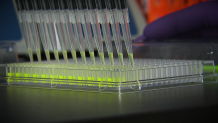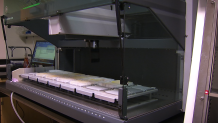The right molecule for stopping the coronavirus may very well be inside UC Berkeley’s Drug Discovery Lab, but until researchers get federal funding, they say they don’t have the resources to find it. And that could be delaying the search for a cure.
“We have a whole list of (research) projects around coronavirus because our faculty here is really cutting edge when it comes to developing novel ways to target diseases,” said Dr. Julia Schaletzky, Director of Emerging and Neglected Diseases at UC Berkeley. “If I had the funding right now, I would start probably in the next couple of weeks already four different projects we have in the works.”

A biochemist trained in Germany, Dr. Schaletzky and her colleague, Eddie Wheri, have spent the last two weeks busily preparing their equipment to fight the pandemic. But they currently lack the money to pay for necessary staffing, chemical compounds, and biosafety gear to conduct the full-scale research needed to battle COVID-19.
"Every day is of essence right now."
Dr. Julia Schaletzky, Biochemist, UC Berkeley Center for Emerging & Neglected Diseases
The funding agencies, the National Science Foundation and National Institutes of Health, have been speeding up their approvals, but Dr. Schaletzky says even the current expedited process is too slow to successfully fight a pandemic that is growing exponentially worldwide by the day.
“Every day is of the essence right now in order to develop something,” Dr. Schaletzky said. “You have to go through accelerated review, which can take up to 60 days, which is just too long.”

Dr. Schaletzky looks at the many steps the coronavirus takes to infect a human cell, and sees opportunity.
The Investigative Unit
Have a tip for The Investigative Unit? Call 1-888-996-TIPS.
For example scientists now have a better understanding of precisely how the virus docks on a human cell and enters.
“It's like a visitor coming to your house who has a key. So the first thing is that the key is to fit into the lock,” Schaletzky said. “You can interrupt that if you just make sure that the key doesn't fit the lock. And that's what we could be doing with small molecules blocking that part. (For scientific explanation of coronavirus infection, see Figure 3 in this journal article)
In a nearby room a robotic assistant works. It’s capable of testing tens of thousands of compounds to find out which one can inhibit the coronavirus attack. But lack of funding right now keeps it from its potential.
Dr. Schaletzky says this is the “lowest hanging fruit” in the search for a cure. “From a clinical perspective, if you find a drug that's already used for another disease and you find that it's also effective against COVID then any doctor in the United States can prescribe it,” she said.
Dr. Schaletzky cites another battlefront for possible research and discovery: controlling a patient’s immune response to the virus.
Scientists have discovered that some seriously ill patients actually have very few virus cells left in their bodies. She said that using that knowledge about how COVID-19 works, doctors could save lives if they learn how to switch off parts of the immune system.
“Sometimes we need the immune system to react to clear the virus, but some of it is also an overreaction, so the immune system goes crazy and destroys all your lung tissue,” Dr. Schaletzky said. “Most scientists want to make a difference and want to try to contribute to a solution…everybody is chomping at the bit to make this happen.”
But scientists’ eagerness to solve these puzzles remains hampered by a federal funding process which, even in a crisis, can take months while the rapid spread of pandemic won’t wait.
NBC Bay Area reached out to the National Institutes of Health for comment about its funding process and timelines, but the agency did not respond.
While it has approved 20 research proposals, the National Science Foundation said it still has 40 research proposals on how best to fight COVID-19 still waiting on approval. The agency did say it has moved forward with 10 rapid response research grants worth more than $1.5 million. (See complete statement from the National Science Foundation.)
“That’s a drop in the bucket,” Dr. Schaletzky said, “especially when you consider the trillions of dollars that coronavirus is going to cost.”



